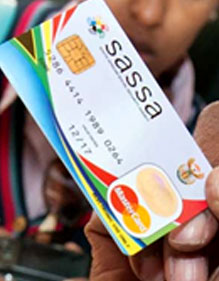|
Getting your Trinity Audio player ready...
|
 A nursing sister at a provincial hospital is alleged to be receiving a child support grant for a child that does not exist. Through a connection at the home affairs department, presumably, the nurse managed to get a birth certificate made for this “child” so she could be eligible to receive a child support grant. A complainant to Corruption Watch claims to have witnessed this act of fraud.
A nursing sister at a provincial hospital is alleged to be receiving a child support grant for a child that does not exist. Through a connection at the home affairs department, presumably, the nurse managed to get a birth certificate made for this “child” so she could be eligible to receive a child support grant. A complainant to Corruption Watch claims to have witnessed this act of fraud.
As this week is International Fraud Awareness Week, we focus on instances of fraud in South Africa’s billion-rand social grant system.
Social grant fraud is defined on the website of the social development department as a situation in which “people receive grants to which they are not entitled. The abuse is putting a severe strain on the social security system, depriving legitimate claimants access to social assistance.
"Some people may be claiming out of ignorance or because they are unable to differentiate between chronic illness and genuine disability. Fraud relating to disability grants includes persons claiming disability for chronic illness or their HIV status.”
Getting rid of fraudulent claimants
Over 600 000 fraudulent social grant recipients were removed from the system in 2013 following a re-registration drive to determine the correct number of legitimate beneficiaries. Government was prompted to go this route after it was found in the previous year that some 5 000 cases of social grant fraud were identified, and the perpetrators were public servants. The net was cast wider and managed to pull in people outside the public service as well. Like the nurse, whose name was given to Corruption Watch, the public servants were defrauding the state at a cost that ran into billions over several years.
As of October this year, the qualifying criteria for child support grants have been extended to include parents who earn less than R3 200 per month, or less than R6 400 jointly in the case of married parents. It is meant as a supporting income for families that would ordinarily struggle to keep up with household expenses, especially those that are child-related.
A child support grant recipient is required to provide proof to authorities of the existence of the child on whose behalf they will receive the grant. In the case of the nurse, it is unclear whether the alleged fraud took place as a result of collusion with a South African Social Services Agency (Sassa) official.
Sassa CEO Virginia Petersen revealed in Parliament earlier this year that although the re-registration process was aimed at removing the bad apples from the system, Sassa discovered, through investigations, that in some cases its employees were involved in the fraud – it thus took action.
Just over 20-million beneficiaries of different social grants are currently registered with Sassa. As far as the agency is concerned, this number is accurate for legitimate recipients. KwaZulu-Natal, Eastern Cape, Limpopo and Gauteng have the most social grants recipients, according to Petersen.
Professionals abusing the system too
Another case reported to Corruption Watch involves the alleged abuse of the disability grant system by a doctor registered with Sassa to facilitate the grant process by verifying disabilities among applicants.
According to the reporter, the doctor, operating in a town in the North West, is responsible for several fraudulent disability certificates. He allegedly colludes with members of the public who seek to defraud the state by posing as disabled persons requiring disability or social relief grant assistance. A standard medical assessment form is completed with inaccurate details, verified by the doctor in question and then processed in the system as a legitimate application.
A person with a proven disability may earn up to R1 350 per month, while a person who requires the temporary social relief grant may receive this for the number of months stipulated by the doctor, at a cost of R1 200 per month to the state.
Using children to illegally get a grant
For those children who are orphaned or cannot be cared for by their parents, the state provides aid for their guardians, called the foster care grant. The adult looking after the child receives the grant of R840 per month. The intricacy of such an arrangement between state and guardian requires a process of monitoring to determine the legitimacy of the fostering.
Social workers play an important role in this process, so their integrity is key. In a case of alleged abuse of power by a social worker, a member of the public provided Corruption Watch with details of an attempt by a social worker to extort money from a foster parent of a disabled child.
According to the complainant, the social worker removed a disabled child from its foster parent without following the correct procedure, only to come back and demand that the monthly grant be paid directly to them.
The complainant suspects that the social worker merely wanted to pocket the money for themselves, and therefore removed the child from a legally savvy foster mother to a less informed one who wouldn’t question their motives or demand the grant.
According to the Children’s Institute at the University of Cape Town, the official number of children receiving foster care grants stands at just over 500 000 countrywide. An adult applying for a foster care grant has to produce a court order that renders them the legal guardian of the child in question.
Even if the fostering is because of the state’s intervention, for instance when a child is moved from one foster parent to a more suitable one by a social worker, there are procedures to be followed and the social worker is accountable for their discretion.
Positive developments
Not all is lost to fraudsters as far as the social grants system is concerned, however. Although it continues to meet other challenges in its operations, Sassa has noted a decline in reported fraud cases relating to grants.
In her budget speech in July, social development minister Bathabile Dlamini said: “A key feature of the current payment model is the institutionalisation of the biometric system, which offers many important benefits, both as a measure to combat fraud and corruption and as a more accurate and reliable means of beneficiary authentication.”
However, questions have been raised about the biometric and voice identification systems used now by the department. The questions focus on firstly, the effectiveness of the systems and secondly, that the systems were part of a R10-billion tender found to have been unlawfully awarded. The winner of the tender, Cash Paymaster Services, was at the centre of a Constitutional Court case brought by Allpay, the losing bidder. Allpay eventually won its case, as the Constitutional Court found that the tender had been irregularly awarded, and ordered that the process be run again from scratch.







